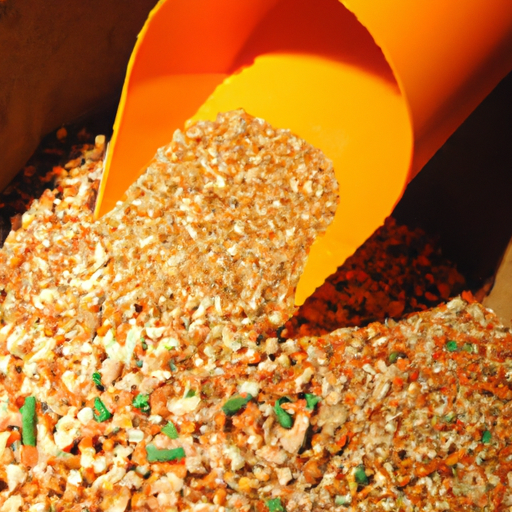Looking to save some money on chicken feed? Well, you’re in luck! In this article, we will explore whether there are any bulk purchasing options available that can help you cut down on the cost of feeding your feathered friends. With the rising prices of poultry feed, finding ways to save without compromising on quality is always a good idea. So, let’s get started and uncover some potential solutions to keep your chickens happy and your wallet even happier!
Benefits of buying chicken feed in bulk
Cost savings
Buying chicken feed in bulk can lead to significant cost savings. When purchasing feed in larger quantities, suppliers often offer lower per-unit prices, allowing you to stretch your budget further. By buying in bulk, you can take advantage of volume discounts and potentially reduce your feed expenses.
Convenience
Buying chicken feed in bulk offers convenience. Instead of constantly running to the store to purchase smaller quantities of feed, you can buy a larger amount at once and have it readily available for your chickens. This ensures that your flock always has access to food and eliminates the need for frequent restocking trips.
Quality control
When purchasing chicken feed in bulk, you have more control over the quality of the feed you provide to your flock. Bulk feed suppliers often prioritize the freshness and nutritional content of their products, ensuring that your chickens receive the best possible feed. Additionally, you can inspect the feed for any signs of spoilage or contamination before purchasing.
Reduced packaging waste
Buying chicken feed in bulk reduces the amount of packaging waste generated. Instead of purchasing multiple small bags of feed, you can opt for larger containers or sacks that can be reused or recycled. This allows you to minimize your environmental footprint and contribute to sustainable farming practices.
Factors to consider before purchasing chicken feed in bulk
Storage space
Before buying chicken feed in bulk, it’s essential to consider the storage space available on your farm. Bulk feed quantities can take up a significant amount of room, so you’ll need to ensure that you have enough space to store it properly. Adequate storage conditions, including protection from moisture, rodents, and pests, are crucial to maintain feed quality.
Feed consumption
Understanding your flock’s feed consumption is vital when buying in bulk. Calculate how much feed your chickens consume within a specific period, considering the number of birds and their individual needs. This knowledge helps you determine the appropriate amount to purchase and avoid waste or shortages.
Feed expiration date
Check the expiration date of the chicken feed you plan to purchase in bulk. It’s important to ensure that the feed has a long shelf life to prevent spoilage and maintain its nutritional value. Buy feed with a reasonable expiration date that aligns with your flock’s consumption patterns.
Variety of feed
Consider the different types of feed you require for your chickens. Some flocks may need specific feeds, such as layer feed or broiler feed. Ensure that the supplier you choose offers a variety of feed options in bulk to meet your flock’s specific dietary requirements.
Supplier credibility
Research the credibility and reputation of potential bulk feed suppliers. Look for reviews or testimonials from other farmers who have purchased feed in bulk from the supplier. It’s crucial to choose a supplier known for providing high-quality feed and who has a reliable track record of timely deliveries.
Finding suppliers for bulk chicken feed
Local feed mills
Local feed mills are a great source for bulk chicken feed. These establishments typically produce their own feed and offer the option to purchase in large quantities. By buying from a local feed mill, you can support your community while obtaining fresh, locally-sourced feed for your chickens.
Online suppliers
Many online suppliers now offer the convenience of purchasing chicken feed in bulk. These suppliers often have a wide range of options, allowing you to choose the specific feed your flock needs. Make sure to verify the credibility of online suppliers before making a purchase and read customer reviews to ensure a positive experience.
Cooperatives
Farm cooperatives can be another excellent resource for bulk purchasing chicken feed. By joining or forming a cooperative, you can pool resources and negotiate favorable prices with suppliers. Cooperatives often offer access to bulk discounts that are not available to individual farmers, helping you save money on your feed purchases.
Farm supply stores
Local farm supply stores or agricultural supply chains can be a valuable source for bulk chicken feed. These stores often carry a variety of feed options and offer competitive pricing for larger quantities. Check with your local farm supply store to see if bulk purchasing options are available and inquire about any discounts or promotions they may offer.
Negotiating prices and terms with suppliers
Comparing prices
Before committing to a supplier, compare prices from different sources to ensure you’re getting the best deal. Take into account factors such as shipping costs and any additional fees or services that suppliers may offer. By comparing prices, you can make an informed decision and maximize your savings.
Order quantity discounts
Many suppliers offer order quantity discounts, where the price per unit decreases as the quantity increases. Take advantage of these discounts by purchasing feed in larger quantities. However, make sure you can store the bulk feed adequately to prevent spoilage and maintain quality.
Flexible payment options
When negotiating with suppliers, inquire about flexible payment options. Some suppliers may offer payment plans or terms that allow you to spread out the cost of your bulk feed purchase. This can be particularly helpful for farmers with budget constraints or cash flow limitations.
Delivery options
Consider the delivery options provided by suppliers. Some may offer free or discounted delivery, while others may require you to arrange transport. Evaluate the logistical feasibility and cost-effectiveness of each option to determine the best arrangement for your farm.
Formulating a feed purchasing plan
Determining feed requirements
To create an effective feed purchasing plan, you need to determine your flock’s feed requirements. Consider factors such as the number of chickens, their age, breed, and production stage (such as laying or broiler). Consult with a poultry nutritionist or veterinarian to ensure your flock’s nutritional needs are met.
Creating a budget
Developing a budget is an essential step in formulating a feed purchasing plan. Consider your overall farm budget, including other expenses, and allocate a portion to feed costs. Take into account any seasonal fluctuations in feed prices and factor them into your budget to prevent unexpected financial strain.
Forecasting feed needs
By forecasting your feed needs, you can effectively plan your bulk purchases. Consider factors such as your flock’s growth rate, anticipated production levels, and any planned expansions or changes in flock size. Regularly analyze your flock’s consumption patterns and adjust your feed quantities accordingly.
Establishing a reorder schedule
Establishing a reorder schedule ensures that you never run out of feed. Determine how frequently you need to reorder and set reminders to place your bulk feed orders in advance. This helps you maintain a steady supply for your flock and prevents any disruptions in feed availability.
Managing feed storage for bulk purchases
Proper storage conditions
Maintaining proper storage conditions is crucial for preserving the quality and freshness of bulk chicken feed. Ensure that your storage area is clean, dry, and well-ventilated to prevent the development of mold, mildew, or pests. Consider investing in storage containers or bins that provide protection from moisture and pests.
Container options
When storing feed in bulk, choose suitable containers that keep the feed fresh and protected. Barrel-style containers with airtight lids are commonly used for bulk feed storage. Ensure that the containers are labeled with the feed type and purchase date for easy identification and rotation.
Inventory tracking
Implement a system to track your feed inventory to prevent shortages or excesses. Regularly update your inventory records, noting the feed type, quantity, and purchase date. This allows you to plan your reorder schedule effectively and ensures you always have enough feed on hand.
Preventing pest infestation
Pests, such as rodents and insects, can be a nuisance and can compromise the quality of your bulk feed. Take preventive measures, such as sealing any gaps or cracks in your storage area, using appropriate pest control methods, and frequently inspecting your storage containers for any signs of infestation.
Tips for maximizing the benefits of bulk purchasing
Joining or forming a buying group
Consider joining or forming a buying group with other farmers in your area to increase your purchasing power. By pooling resources and negotiating bulk prices together, you can access even greater cost savings opportunities. Participating in a buying group also fosters networking and knowledge-sharing within the farming community.
Sharing orders with other farmers
Collaborate with neighboring farmers to share bulk feed orders. This can help reduce individual costs and minimize waste if you don’t require large quantities all at once. By coordinating with other farmers, you can split the order and still take advantage of the benefits of bulk purchasing.
Taking advantage of seasonal sales
Watch for seasonal sales or promotions offered by feed suppliers. Some suppliers may offer discounted prices during peak seasons or holidays. By planning your bulk purchases around these sales, you can maximize your savings and potentially secure additional benefits such as free delivery or bonus products.
Planning ahead for feed price fluctuations
Feed prices can vary throughout the year due to factors such as crop yields and market demand. Stay informed about industry trends and plan your bulk purchases in advance to take advantage of lower prices. This foresight can help you mitigate the impact of fluctuating feed costs on your budget.
Considerations for organic or specialty feed
Availability of bulk options
When purchasing organic or specialty feed in bulk, ensure that suppliers offer the specific options you require. Not all suppliers may stock organic or specialty feed, so it may require additional research and inquiry to find suitable bulk purchasing options. Take note of any organic certifications or labeling requirements that the feed must meet.
Certification requirements
If you require organic feed, ensure that the suppliers you consider are certified organic. Certification ensures that the feed meets specific standards for organic production, including the absence of synthetic additives or genetically modified ingredients. Verify the authenticity of the organic certification to ensure your chickens receive genuinely organic feed.
Price comparison with conventional feed
Compare the prices of organic or specialty feed with conventional feed options to assess the cost implications. Bulk organic or specialty feed may have a higher price tag due to the quality of ingredients and the production processes involved. Evaluate the benefits of organic or specialty feed against the potential increase in cost.
Monitoring feed quality and freshness
Performing regular quality checks
Regularly monitor the quality of your bulk chicken feed to ensure it remains fresh and free from contamination. Conduct visual inspections for signs of mold, insects, or other abnormalities. Additionally, periodically assess the nutritional content of the feed through laboratory testing to confirm its adequacy for your flock’s requirements.
Rotating feed to prevent spoilage
To prevent feed spoilage, implement a rotation system. Use the oldest feed first to ensure freshness and quality. This prevents feed from sitting in storage for extended periods, reducing the risk of spoilage and maintaining optimal nutrient levels for your chickens.
Tracking feed usage and consumption
Keep track of your flock’s feed usage and consumption patterns. Regularly monitor how much feed your chickens consume to detect any changes in appetite or feed preferences. This data helps you adjust your purchasing plan and ensures that you provide an adequate supply of feed for your flock.
Adjusting feed formulas if needed
Occasionally reassess your feed formulas to ensure they meet your flock’s evolving needs. Factors such as age, production stage, or health conditions may require adjustments to the feed composition. Consult with a poultry nutritionist or veterinarian to modify feed formulas accordingly, ensuring optimal nutrition for your chickens.
Alternative options for reducing feed costs
Homegrown feed ingredients
Consider incorporating homegrown feed ingredients into your flock’s diet to reduce costs. Growing your own crops, such as corn, grains, or vegetables, can supplement commercial feed and reduce your reliance on purchased feed. Ensure that homemade feed ingredients meet your flock’s nutritional requirements and consult with a poultry nutritionist for guidance.
Supplementing with pasture or forage
Utilize pasture or forage to supplement your flock’s diet, particularly for free-range or grazing chickens. Allow chickens to forage in designated areas, providing them with access to grass, insects, and other natural food sources. The natural grazing activity reduces the need for additional feed and can lower your overall feed costs.
Utilizing feed additives or supplements
Consider incorporating feed additives or supplements to enhance the nutritional value of your flock’s feed. These additives can enhance digestion, promote stronger eggshells, improve immune function, or enhance growth. Consult with a poultry nutritionist or veterinarian for recommendations on appropriate additives or supplements for your specific needs.
Exploring alternative protein sources
Traditional protein sources in chicken feed, such as soybean meal or fishmeal, can be costly. Explore alternative protein sources like insects, mealworms, or black soldier fly larvae as potential substitutes. These alternative protein sources can offer comparable nutrition at a fraction of the cost.
By considering these factors, finding reputable suppliers, negotiating favorable prices, and implementing effective feed management practices, you can harness the benefits of buying chicken feed in bulk. With careful planning and attention to your flock’s nutritional needs, bulk purchasing can be a cost-effective and environmentally conscious approach to feeding your chickens.




